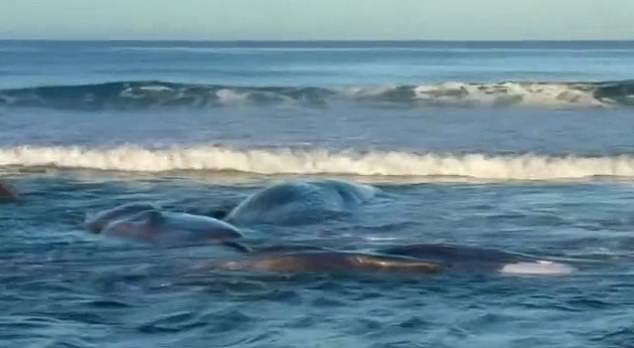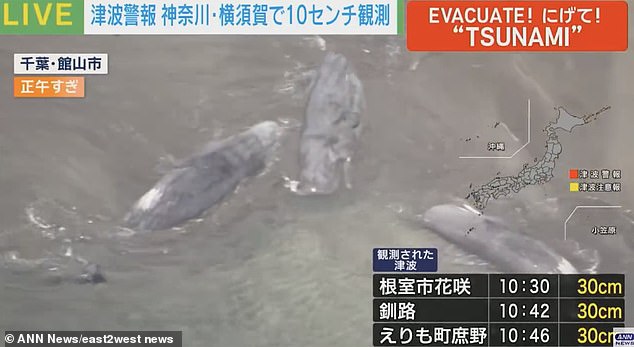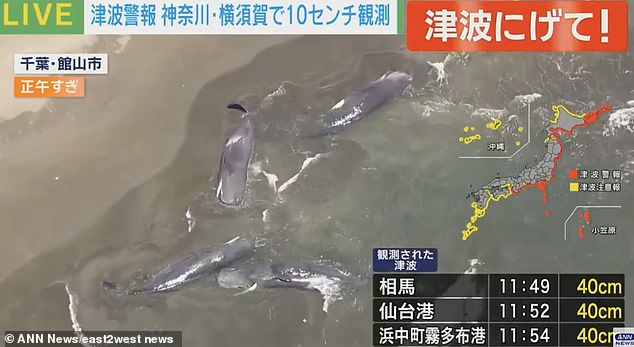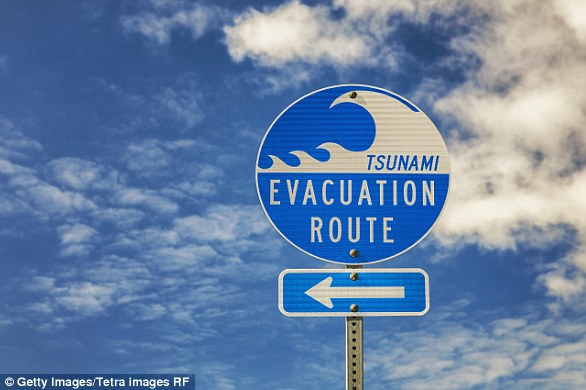Four whales that beached in Japan could have been stranded by the huge earthquake that triggered tsunami warnings, experts have revealed.
Filmed in Tateyama, Chiba prefecture, heartbreaking footage shows the huge creatures laying within a few feet of each other on the beach.
Parts of Japan have now been struck by 5ft waves, but the whales appeared to have become stranded before they hit.
This poses the question – how did the whales end up there in the first place?
According to Professor Peter Evans, Director of the Sea Watch Foundation, the answer may lie in an increase in underwater noise, causing the whales to become disorientated.
Speaking to MailOnline, he explained: ‘Whales, particularly deep diving species, are susceptible to hearing damage from underwater noise.
‘Sea quakes are one source of very loud noise.
‘I imagine that the earthquake off Russia has caused major tremors initiating the tsunami and that all of that has had impacts on whales.’

Heartbreaking footage has revealed that at least four giant whales are stranded on a beach in Japan amid the tsunami warnings

Filmed in Tateyama, Chiba prefecture, the footage shows the huge creatures laying within a few feet of each other on the beach
Japan was struck by tsunami waves approaching five feet on Wednesday as the biggest earthquake for 14 years caused millions to evacuate.
Tidal waves struck parts of Russia, Japan and the United States in the aftermath of a magnitude 8.8 earthquake off Russia’s eastern Kamchatka Peninsula.
The earthquake was the sixth most powerful on record, and the strongest in Kamchatka region since 1952, with aftershocks of up to 7.5 magnitude expected.
It is the largest earthquake globally since 2011, when a 9.1 megaquake hit northeast Japan and left 19,747 people either dead or missing.
Dr David Rugh, a retired whale expert at the National Oceanic and Atmospheric Administration (NOAA), explained that most whales are usually unaffected by tsunamis.
Writing in an article for Journey North, he said: ‘Whales will be almost unaffected.
‘At sea they will have the sensation of a wave passing when the tsunami goes by, much as vessels at sea do, without any deleterious affect.
‘The place where there might be a problem would be near shore when a tsunami rapidly pulls water out to sea before a wave hits the shore.

Dr David Rugh, a retired whale expert at the National Oceanic and Atmospheric Administration (NOAA), explained that most whales are usually unaffected by tsunamis
‘Whales might be stranded for a moment and then pushed hard against tidal rocks as the tsunami overwhelms them.
‘Therefore, the degree of impact may be a function of proximity to the coast.’
The expert highlights that tsunamis vary in size and dynamics, so it will not be consistent in how they impact whales.
‘Videos of tsunamis sometimes show a beach becoming exposed for a short while, and then a high wave comes in,’ he added.
‘If a whale was very near the beach at that moment, it might be pulled out to sea or — for a few tens of seconds — it might be stranded.
‘It’s the force of the incoming wave that could be especially hard on living things.’

